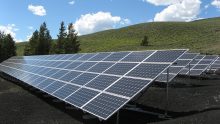Hundreds of millions of phones (and smartphones) have been activated in Africa. But the aspiration of portable and renewable off-Grid solutions for all households still appears far-fetched. In countries like Nigeria, many urban households have a captive generator but will rarely consider a comparably–priced solar solution or its analogues; despite growing calls for green energy adoption. What could be the easiest pathway to providing electricity for households in Sub-Saharan Africa? Large scale renewable and fossil initiatives are good but Africa may not have the financial capacity to speedily execute these solution. Multi-billion dollar power projects are in the pipeline in many countries, including gas-fired power plants. They are commendable and also required to support manufacturing; but Africa may have de-emphasized the faster route to wide, sustainable and reliable electricity for households.
The emphasis on extending the grid ignores the knock-on effect of promoting “off-grid solutions” that could power households (such as solar panels). Present pace of portable off-Grid adoption makes this ambition seem a herculean task. But there are 910 million mobile subscriptions in Africa (at Q1 2015), including numerous smart phones that are priced within a narrow range of some household-sized off-Grid solution. Similarly, achieving 67% mobile penetration within a decade and half, may have been viewed as impossible at the onset. Off-grid solutions can surpass this figure in a shorter time frame; perhaps, the existence of alternative/unreliable grid electricity is the source of the distraction, discouraging African power stakeholders from exploring the convenient, speedy, simpler and sometimes cheaper off-grid pathway to power access.
Mobile technology adoption was (and is) a critical driver of economic growth and development in Africa. It provided the needed tool for growth leapfrogging. Off-Grid power solutions have even greater potentials. When African leaders and decision makers realized the promise that mobile technology and internet held, they moved to grow adoption and penetration. Today mobile is widely used to create value across diverse settings; from enabling financial access to rural (or bypassed) communities, to facilitating local and international trade and even governance. The model that was used to grow mobile technology can and should be used to grow off-Grid technology in Africa. Hewlett-Packard (HP) recently reported that Africa became a “smartphone-centric society” when it doubled its smartphone penetration from 32% in the third quarter of 2013 to 61% two years later. That value is now 67 percent.
Political will & business environment
In the wake of mobile access in Africa; governments and stakeholders rose to the call of providing an enabling environment for mobile technology growth. Far reaching review of policies and regulatory frameworks were embarked on. The quality of governance was also being enhanced to lower the political risk which could deter the flow of huge private sector investments. Several fiscal incentives were implemented that also made the region a good destination for international funds and telecom service providers. Financial institution in places such as Nigeria provided both capital and advisory capacity for mobile-based businesses which led to their proliferation.
Given the fact that the achievements of mobile/internet has created opportunities in Africa that are now stifled –ironically – by gross power deficits (including frequent inability to charge 910 million mobile phones); it’s imperative that off-Grid focused incentives and political initiatives be speedily implemented in Africa. The execution of these incentives must also rise above present day rhetoric. The portability, reliability and sustainability of off-Grid technologies are especially suitable for the low kWh requirements of average households in Sub-Saharan Africa. Despite the small, daily, household-power requirements, the repercussions of power deficit for households are far reaching; limiting women and children’s access to education and quality information, as well as, lowering the availability and standard of healthcare. While main grid solution and big projects are needed to drive power-intensive manufacturing and heavy industries; small and medium sized enterprises (SMEs) which drive most African economies can move much farther with off-Grid.
Private sector collaboration
Prior to the advent of mobile, existing telecommunication infrastructure in Africa was aged. The development of new infrastructure, required active private sector participation and leadership. Similarly, many years of state-controlled operation of power infrastructure left majority of the power assets in bad condition. The improvement in grid electrification that has been witnessed in countries such as Nigeria, Cameroon and Kenya were largely driven by private sector participation. In Cameroon the involvement of France-based Actis in funding Eneo Cameroon (in partnership with the Cameroonian government) was essential to the success recorded in that country.
An aggressive and private sector-driven campaign for off-Grid solutions, will achieve or surpass present day mobile penetration. A conscious tearing down of investment barriers that will enable Off-Grid solutions to flourish is required for success. Mobile technology arrived in Africa as a product for the rich (phones and SIM cards were sold for outrageous amounts across several markets) but they later become common and very affordable. The already falling price of some off-Grid renewable solutions will be further driven down by mass adoption which will bring on some economy of scale. These off-Grid opportunities may not be readily visible and achievable without a plan; they are nevertheless attainable.
Despite the liberalization of the power investment environment by many governments, there still exist relics of the era of state-owned utility companies. It’s time for Africa to tear them down completely and encourage off-Grid renewable solutions by trailing the footprints of mobile.
Chijioke Mama is a Senior Energy Research Analyst and a Syndicated Columnist with research interests spanning Sub-Saharan Africa. Chijioke.mama@yahoo.com M: +2347061013333



